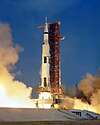Saturn B-1
| Manufacturer | Von Braun |
|---|---|
| Country of origin | United States |
| Size | |
| Height | 74 m (242.00 ft) |
| Diameter | 6.52 m (21.39 ft) |
| Mass | 680,420 kg |
| Stages | 4 (all used on various vehicles, now retired) |
| Launch history | |
| Status | Never flown |
| Launch sites | N/A |
| First stage - S-IB | |
| Engines | 8 × Rocketdyne H-1b |
| Thrust | 1,852,822 lbf (8,241.76 kN) |
| Burn time | 155 seconds |
| Propellant | RP-1/LOX |
| Second stage Titan Cluster | |
| Engines | 4 LR-89-5 |
| Thrust | 2940.000 kN |
| Burn time | 137 seconds |
| Propellant | RP-1/LOX |
| Third stage - S-IV | |
| Engines | 6 RL-10 |
| Thrust | 400.346 kN |
| Burn time | 482 seconds |
| Propellant | LH2/LOX |
| Fourth stage - Centaur C | |
| Engines | 2 RL-10A-1 |
| Thrust | 133.448 kN |
| Burn time | 430 sec |
| Propellant | LH2/LOX |
Studied in 1959, the Saturn B-1,[1] was a four-stage concept rocket similar to the Jupiter-C, and consisted of a Saturn IB first stage, a cluster of four Titan I first stages used for a second stage, a S-IV third stage and a Centaur high-energy liquid-fueled fourth stage.[2][3] Like its proposed predecessors, the Saturn B-1 never flew and neither did the Titan cluster stage. The S-IV however flew on the Saturn I.
See also
References
- ^ "Saturn B-1". 2016-12-28. Archived from the original on 2016-12-28. Retrieved 2024-05-27.
- ^ Bilstein, Roger E. (1996). Stages to Saturn: a technological history of the Apollo/Saturn launch vehicles. The NASA history series. Washington, DC: National Aeronautics and Space Administration, NASA History Office : For sale by the U.S. G.P.O., Supt. of Docs. ISBN 978-0-16-048909-9.
- ^ Koelle, Heinz Hermann; Street, R. E. (1962-10-01). "Handbook of Astronautical Engineering". Physics Today. 15 (10): 60–62. doi:10.1063/1.3057803. ISSN 0031-9228.

